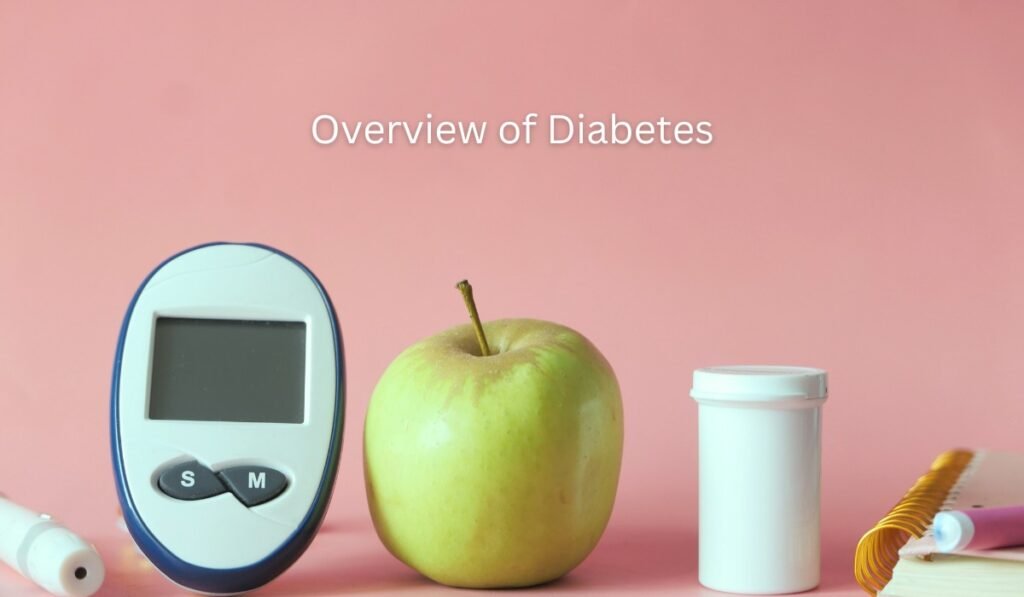Diabetes mellitus refers to a group of diseases that affect how the body uses blood sugar (glucose). Glucose serves as an essential source of energy for the cells in our muscles and tissues, as well as the brain’s primary fuel.
Types of Diabetes
Type 1 Diabetes: Typically diagnosed in childhood or adolescence, this form occurs when the immune system attacks and destroys the insulin-producing cells in the pancreas. People with type 1 diabetes require insulin therapy.
Type 2 Diabetes: More common in adults, the type 2 diabetes results from insulin resistance (where the body doesn’t use insulin effectively) or insufficient insulin production. Lifestyle changes, oral medications, and sometimes insulin injections are used to manage it.
Gestational Diabetes: It is a condition that develops during pregnancy in women who do not have diabetes before. Gestational diabetes often does not cause noticeable symptoms but some women may experience mild signs such as increased thirst and/or more frequent urination. Causes could be hormonal changes and weight gain leading to insulin resistance during pregnancy. Gestational diabetes mostly disappears after pregnancy.
Symptoms
- Increased thirst and hunger
- Frequent urination
- Fatigue
- Blurred vision
- Slow wound healing
Complications
- Over time, high blood sugar can damage blood vessels, nerves, eyes, kidneys, and the heart.
- Complications include heart disease, stroke, kidney failure, neuropathy, and retinopathy.
Prevention and Management
- Maintain a healthy weight
- Be physically active
- Monitor blood sugar levels
- Follow a balanced diet
- Take medications as prescribed.
Treatment of Diabetes
Treatment for all types involves managing blood glucose levels, often through a combination of lifestyle modifications and medication.
A) Lifestyle Modifications for Effective Diabetes Management
Some key lifestyle modifications that could help manage diabetes effectively:
Healthy Eating
- Balanced Diet: Focus on a diet rich in vegetables, fruits, whole grains, lean proteins, and healthy fats.
- Carbohydrate Counting: Monitor carbohydrate intake to manage blood sugar levels.
- Portion Control: Be mindful of portion sizes to avoid overeating.
Regular Physical Activity
- Exercise Routine: Aim for at least 150 minutes of moderate-intensity exercise per week, such as walking, cycling, or swimming.
- Strength Training: Include resistance exercises to build muscle and improve insulin sensitivity.
Weight Management
- Weight Loss: Losing even a small amount of weight can significantly improve blood sugar control.
- Sustainable Changes: Focus on long-term, sustainable lifestyle changes rather than quick fixes.
Stress Management
- Relaxation Techniques: Practice yoga, meditation, or deep-breathing exercises to reduce stress levels.
- Adequate Sleep: Ensure you get enough quality sleep, as poor sleep can affect blood sugar levels.
Smoking Cessation
- Quit Smoking: Smoking can increase the risk of diabetes complications. Seek support to quit smoking.
Regular Monitoring and Checkups
- Blood Sugar Monitoring: Regularly check your blood sugar levels to understand how different foods and activities affect them.
- Medical Checkups: Visit your healthcare provider regularly for checkups and to adjust your management plan as needed.
Alcohol Moderation
- Limit Alcohol: If you drink alcohol, do so in moderation and always with food to prevent blood sugar spikes. Best is to quit drinking.
B) Medication for Diabetes
For T1D and LADA, insulin therapy is typically required.
For T2D, initial treatment may involve lifestyle modifications and oral agents, but insulin therapy may be needed as β-cell function deteriorates.
Apart from insulin therapy, there are several medicines available for diabetes management and control.
It requires proper diagnosis, monitoring, health risk profile assessments and personalised advice from qualified healthcare professionals and specialists (endocrinologists & diabetologists).
References
Disclaimer: This article is for informational purposes only and should not be considered as a substitute for professional medical advice. Consult with a healthcare provider for diagnosis and treatment of any chronic illnesses.

